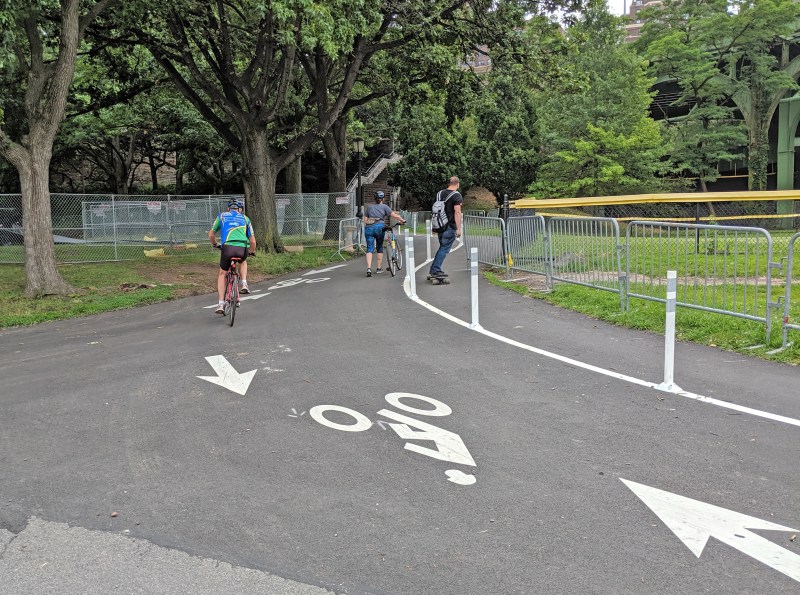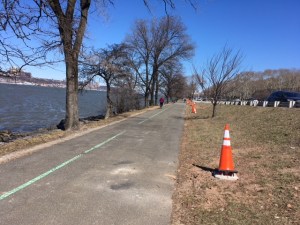No Big Changes Coming to Dangerous Riverside Park Bike ‘Detour’

The Parks Department is not taking cyclists’ concerns seriously regarding a hastily built, steep, dark, root-damaged detour from the Hudson River Greenway that was installed in a “rogue” operation by the agency to separate pedestrians from cyclists along the much-used river route — and may have made the problem worse, bike riders are saying.
More than a dozen cyclists testified against the month-old detour at a meeting of Community Board 7 on Monday, but Riverside Park Administrator John Herrold dashed any hopes that the Parks Department will make improvements that could ensure that the “shared path” live up to its purpose — which “began with a concern for safety. Everyone’s safety,” Herrold said.
Herrold cited a lack of funding for additional improvements to the $200,000 route, which the Parks Department built on its own, with limited input from the Department of Transportation, which has considerable experience with bike lanes.
“They totally went rogue,” a city government source who is intimate with the Parks Department process told Streetsblog. “Best bike lane in the city … and they just don’t give a fuck. They are discouraging cycling.”
Safety for both two-wheeled and two-footed users of the path has been a concern ever since mid-June, when the Parks Department barred cyclists from using the Greenway between 72nd and 83rd streets — a stretch of the busiest bike path in North America where cyclists and pedestrians share the space. The Parks Department said it was motivated by a small number of collisions between cyclists and also between cyclists and pedestrians, including a crash between a bike rider and a 4-year-old in April.
“Some park users recommended that this proposed detour route be placed on the Participatory Budgeting ballot conducted by Council Member Helen Rosenthal to fund the necessary work,” said Parks Department spokeswoman Megan Moriarty. “It received enough votes to pass because people wanted to prevent those conflicts in this busy area of the park.” (Update: That money was voted on in the 2015 round of participatory budgeting.)
Signs at both ends of the detour along the water now order cyclists to dismount or ride up a hilly, bumpy and poorly marked inland bypass that is itself shared with pedestrians, many of whom are unaware that they have strayed onto a major bike route. On this path, cyclists must climb an approximately eight-percent grade to the top of the Boat Basin Rotunda at 79th Street and then brace for a fast descent on a narrow path where they may encounter dog walkers, Little Leaguers, Dumpsters and the occasional motor vehicle. (Moriarty did not deny that the Parks Department built the path to its own specifications, saying only, “We discussed the traffic circle with DOT in the context of the Rotunda design.”)
Cyclists don’t want to share the space with pedestrians — and pedestrians don’t like being startled to find there are cyclists on the path. It’s a prescription for disaster, said some bike riders. Cyclists say there have been several crashes since the detour was built.
“We’re waiting for a fatality on that bike path,” said Upper West Side cyclist Arnold Schickler.
Herrold said there would be some minor improvements to the bare-bones design for the new bike route, but no repairs of the root damage that is dangerous at night, and no additional illumination along the heavily wooded area. There will be some yellow signs that say, “Caution: shared path,” Herrold said (the signs do not include the symbol of a bike, making them confusing, cyclists said).
Bike riders seemed most frustrated with Herrold’s lack of concern for their needs. The administrator, who does not have a background in transportation, continually called the detour a “shared route,” angering cyclists who don’t want to endanger pedestrians, but also desire a path of their own — as they have below 72nd Street on the busy Greenway. He differed with several board members and members of the public about the sufficiency of existing lighting.
Parks Committee Co-Chairman and street safety advocate Ken Coughlin — who has since been demoted by CB7 Chairwoman Roberta Semer (for reasons not made public but are being investigated by Streetsblog) — repeatedly challenged Herrold on insufficient signage that is not sufficient to prevent cyclists and pedestrians to mingle.
“Pedestrians are walking in the bike lane and the bike lane is quite narrow,” Coughlin said.
“It isn’t really a bike lane,” Herrold said. “It is a shared path.”
Coughlin declined to back down.
“But there’s a section with a bike icon and bollards,” he said. “Clearly you are intending to separate users.”
“We’re intending to protect pedestrians,” Herrold said.
“Maybe one part of protecting pedestrians is to warn them not to be where the bike icon is,” Coughlin pressed, prompting Herrold to point out that pedestrians will continue to use the path to get to ballfields and a track.
“Yes,” Coughlin added, “but you would [want them to] walk on the side.”
“I will look at it,” a clearly annoyed Herrold said. “But it is a shared path. It’s not a bike lane.”
Members of the public picked up on Coughlin’s frustration [watch the full meeting here].
Lawyer Steve Vaccaro said it is “shocking that the Parks Department [built the detour] in without getting the necessary expertise and without having sufficient funding” to make the new path safe.
Upper Manhattanite Angel Tripp testified that she used to ride through the park to feel safe. But the detour, she said, is “as risky as riding in the road.”
Tripp also urged board members to take a broader perspective than they would about a typical change to a local park.
“This is not just about the Upper West Side,” she said. “There are people from all over the city who use this path. This is the path that connects the Bronx and Upper Manhattan to downtown Manhattan and Brooklyn and vice versa. This is not just about you all. This is about all of us in the city. This is a main artery.”
Upper West Sider Rhonda Shafner also said she doesn’t feel safe on the detour.
“I am now biking to work on Riverside Drive, where there is no bike path and with all the traffic it is not as safe as a bike path,” she said.
Two resolutions were defeated. One, by board member — and Streetsblog op-ed contributor — Richard Robbins called for the detour to be scrapped entirely. That motion was defeated 6-2, with only Coughlin voting with Robbins. Board member Klari Neuwelt asked the Parks Department to consider allowing cyclist to return to the waterfront path during winter, when there are very few pedestrians. That motion also went nowhere. It may be revisited in the fall.

